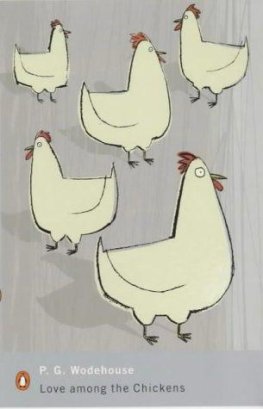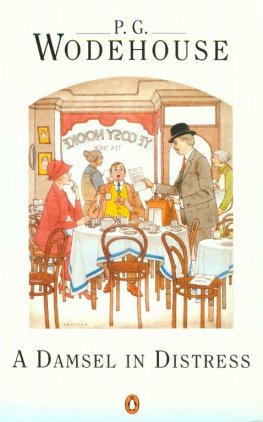Pelham Wodehouse - The Coming of Bill
Here you can read online Pelham Wodehouse - The Coming of Bill full text of the book (entire story) in english for free. Download pdf and epub, get meaning, cover and reviews about this ebook. genre: Prose / Humor. Description of the work, (preface) as well as reviews are available. Best literature library LitArk.com created for fans of good reading and offers a wide selection of genres:
Romance novel
Science fiction
Adventure
Detective
Science
History
Home and family
Prose
Art
Politics
Computer
Non-fiction
Religion
Business
Children
Humor
Choose a favorite category and find really read worthwhile books. Enjoy immersion in the world of imagination, feel the emotions of the characters or learn something new for yourself, make an fascinating discovery.

- Book:The Coming of Bill
- Author:
- Genre:
- Rating:5 / 5
- Favourites:Add to favourites
- Your mark:
- 100
- 1
- 2
- 3
- 4
- 5
The Coming of Bill: summary, description and annotation
We offer to read an annotation, description, summary or preface (depends on what the author of the book "The Coming of Bill" wrote himself). If you haven't found the necessary information about the book — write in the comments, we will try to find it.
The Coming of Bill — read online for free the complete book (whole text) full work
Below is the text of the book, divided by pages. System saving the place of the last page read, allows you to conveniently read the book "The Coming of Bill" online for free, without having to search again every time where you left off. Put a bookmark, and you can go to the page where you finished reading at any time.
Font size:
Interval:
Bookmark:
The Coming of Bill
by P. G. Wodehouse
1920
BOOK ONE
Chapter I
A Pawn of Fate
Mrs. Lora Delane Porter dismissed the hireling who had brought her automobile around from the garage and seated herself at the wheel. It was her habit to refresh her mind and improve her health by a daily drive between the hours of two and four in the afternoon.
The world knows little of its greatest women, and it is possible that Mrs. Porter's name is not familiar to you. If this is the case, I am pained, but not surprised. It happens only too often that the uplifter of the public mind is baulked by a disinclination on the part of the public mind to meet him or her half-way. The uplifter does his share. He produces the uplifting book. But the public, instead of standing still to be uplifted, wanders off to browse on coloured supplements and magazine stories.
If you are ignorant of Lora Delane Porter's books that is your affair. Perhaps you are more to be pitied than censured. Nature probably gave you the wrong shape of forehead. Mrs. Porter herself would have put it down to some atavistic tendency or pre-natal influence. She put most things down to that. She blamed nearly all the defects of the modern world, from weak intellects to in-growing toe-nails, on long-dead ladies and gentlemen who, safe in the family vault, imagined that they had established their alibi. She subpoenaed grandfathers and even great-grandfathers to give evidence to show that the reason Twentieth-Century Willie squinted or had to spend his winters in Arizona was their own shocking health 'way back in the days beyond recall.
Mrs. Porter's mind worked backward and forward. She had one eye on the past, the other on the future. If she was strong on heredity, she was stronger on the future of the race. Most of her published works dealt with this subject. A careful perusal of them would have enabled the rising generation to select its ideal wife or husband with perfect ease, and, in the event of Heaven blessing the union, her little volume, entitled "The Hygienic Care of the Baby," which was all about germs and how to avoid them, would have insured the continuance of the direct succession.
Unfortunately, the rising generation did not seem disposed to a careful perusal of anything except the baseball scores and the beauty hints in the Sunday papers, and Mrs. Porter's public was small. In fact, her only real disciple, as she sometimes told herself in her rare moods of discouragement, was her niece, Ruth Bannister, daughter of John Bannister, the millionaire. It was not so long ago, she reflected with pride, that she had induced Ruth to refuse to marry Basil Milbanka considerable feat, he being a young man of remarkable personal attractions and a great match in every way. Mrs. Porter's objection to him was that his father had died believing to the last that he was a teapot.
There is nothing evil or degrading in believing oneself a teapot, but it argues a certain inaccuracy of the thought processes; and Mrs. Porter had used all her influence with Ruth to make her reject Basil. It was her success that first showed her how great that influence was. She had come now to look on Ruth's destiny as something for which she was personally responsiblea fact which was noted and resented by others, in particular Ruth's brother Bailey, who regarded his aunt with a dislike and suspicion akin to that which a stray dog feels towards the boy who saunters towards him with a tin can in his hand.
To Bailey, his strong-minded relative was a perpetual menace, a sort of perambulating yellow peril, and the fact that she often alluded to him as a worm consolidated his distaste for her.
* * * * *Mrs. Porter released the clutch and set out on her drive. She rarely had a settled route for these outings of hers, preferring to zigzag about New York, livening up the great city at random. She always drove herself and, having, like a good suffragist, a contempt for male prohibitions, took an honest pleasure in exceeding a man-made speed limit.
One hesitates to apply the term "joy-rider" to so eminent a leader of contemporary thought as the authoress of "The Dawn of Better Things," "Principles of Selection," and "What of To-morrow?" but candour compels the admission that she was a somewhat reckless driver. Perhaps it was due to some atavistic tendency. One of her ancestors may have been a Roman charioteer or a coach-racing maniac of the Regency days. At any rate, after a hard morning's work on her new book she felt that her mind needed cooling, and found that the rush of air against her face effected this satisfactorily. The greater the rush, the quicker the cooling. However, as the alert inhabitants of Manhattan Island, a hardy race trained from infancy to dodge taxicabs and ambulance wagons, had always removed themselves from her path with their usual agility, she had never yet had an accident.
But then she had never yet met George Pennicut. And George, pawn of fate, was even now waiting round the corner to upset her record.
George, man of all work to Kirk Winfield, one of the youngest and least efficient of New York's artist colony, was English. He had been in America some little time, but not long enough to accustom his rather unreceptive mind to the fact that, whereas in his native land vehicles kept to the left, in the country of his adoption they kept to the right; and it was still his bone-headed practice, when stepping off the sidewalk, to keep a wary look-out in precisely the wrong direction.
The only problem with regard to such a man is who will get him first. Fate had decided that it should be Lora Delane Porter.
To-day Mrs. Porter, having circled the park in rapid time, turned her car down Central Park West. She was feeling much refreshed by the pleasant air. She was conscious of a glow of benevolence toward her species, not excluding even the young couple she had almost reduced to mincemeat in the neighbourhood of Ninety-Seventh Street. They had annoyed her extremely at the time of their meeting by occupying till the last possible moment a part of the road which she wanted herself.
On reaching Sixty-First Street she found her way blocked by a lumbering delivery wagon. She followed it slowly for a while; then, growing tired of being merely a unit in a procession, tugged at the steering-wheel, and turned to the right.
George Pennicut, his anxious eyes raking the middle distanceas usual, in the wrong directionhad just stepped off the kerb. He received the automobile in the small of the back, uttered a yell of surprise and dismay, performed a few improvised Texas Tommy steps, and fell in a heap.
In a situation which might have stimulated another to fervid speech, George Pennicut contented himself with saying "Goo!" He was a man of few words.
Mrs. Porter stopped the car. From all points of the compass citizens began to assemble, many swallowing their chewing-gum in their excitement. One, a devout believer in the inscrutable ways of Providence, told a friend as he ran that only two minutes before he had almost robbed himself of this spectacle by going into a moving-picture palace.
Mrs. Porter was annoyed. She had never run over anything before except a few chickens, and she regarded the incident as a blot on her escutcheon. She was incensed with this idiot who had flung himself before her car, not reflecting in her heat that he probably had a pre-natal tendency to this sort of thing inherited from some ancestor who had played "last across" in front of hansom cabs in the streets of London.
She bent over George and passed experienced hands over his portly form. For this remarkable woman was as competent at first aid as at anything else. The citizens gathered silently round in a circle.
"It was your fault," she said to her victim severely. "I accept no liability whatever. I did not run into you. You ran into me. I have a jolly good mind to have you arrested for attempted suicide."
Font size:
Interval:
Bookmark:
Similar books «The Coming of Bill»
Look at similar books to The Coming of Bill. We have selected literature similar in name and meaning in the hope of providing readers with more options to find new, interesting, not yet read works.
Discussion, reviews of the book The Coming of Bill and just readers' own opinions. Leave your comments, write what you think about the work, its meaning or the main characters. Specify what exactly you liked and what you didn't like, and why you think so.



